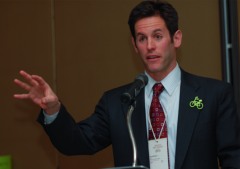
Oregon Bike Summit today.
(Photo © J. Maus)
Speaking at the opening session of the Oregon Bike Summit today, Bicycle Transportation Alliance (BTA) Executive Director Scott Bricker gave a rundown of their existing priority bills in the 2009 legislative session.
With the door officially closed on Idaho Stops (interesting report about it on the Mercury blog today) and with news today that their Driver’s Education bill (HB 3252) will not move forward this session, the BTA is pouring all remaining efforts into their vehicular homicide bill, HB 3399.
Addressing over 100 bike advocates from throughout Oregon, Bricker said the bill is “alive and kicking”. The bill was given a public hearing earlier this month. During that hearing, a need for amendments was raised. Bricker says the BTA is still working on getting those amendments back and they hope to have them ready before an important work session with the House Judiciary committee set for this Thursday.
Besides the amendments, the larger hurdle for the bill is that it still must get through the Ways and Means Committee to discuss the fiscal components of the bill. With Oregon’s budget in crisis this session, Bricker says Ways and Means is “the graveyard for most bills”. After Ways and Means it would be referred to another committee. “We don’t know what committee it will go to after that,” said Bricker, and he added that they hope it goes to the Public Safety committee.
Idaho Stops got all the publicity, but HB 3399 is the BTA’s big iron in the fire. They have been working on it for years and it would fill a glaring gap in our state’s laws.
In a recent update on their blog, the BTA wrote that they have already met with most of the House Judiciary Committee and received positive comments.
Stay tuned for more on this bill.



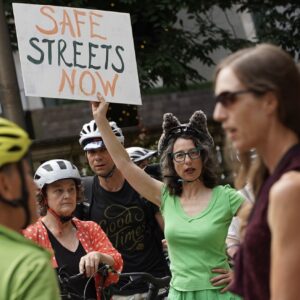
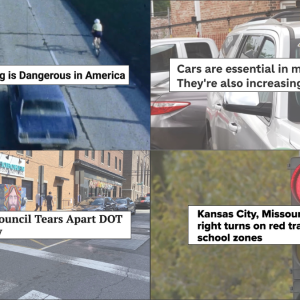
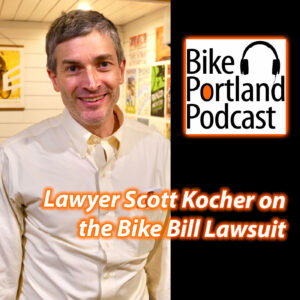
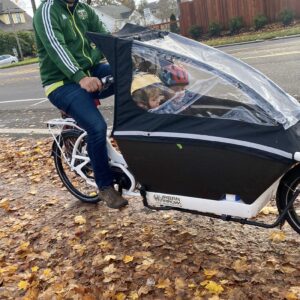
Thanks for reading.
BikePortland has served this community with independent community journalism since 2005. We rely on subscriptions from readers like you to survive. Your financial support is vital in keeping this valuable resource alive and well.
Please subscribe today to strengthen and expand our work.
Good luck Scott – this bill is very important.
Ditto what Todd said. It’s a good bill. Can’t see anyone having a defensible argument against it.
How about the bill to ban cell phone use while driving. I think that is also a critical bill for everyone’s safety.
It’s a lousy bill.
Under the most recent version, the one for which a hearing was held earlier this month, it would punish the driver involved in a fatal accident if the driver’s license was suspended or the driver lacks insurance, even if the driver was not at fault at all. Driving while suspended and driving without insurance are both punishable offenses. Criminally negligent homicide is a severe criminal offense.
I don’t know what this bill could accomplish that isn’t already accomplished by laws relating to manslaughter and criminally negligent homicide. Is there a gap in the current law that proponents can identify? Criminal penalties should follow traffic accidents only if negligent driving or other culpable conduct caused the accident.
Respectfully, I disagree wholeheartedly, Rankin. If you are not behind the wheel when you aren’t supposed to be in the first place, the accident doesn’t happen, at least not to you. Getting behind the wheel when legally prohibited is criminal and criminally negligent. That criminal driver gets to own whatever happens while he/she is behind the wheel, regardless of fault. Eliminate the driver, eliminate the accident involving the driver. It’s that simple. As I tell my students, own your mistake, deal with the consequences, and move forward.
so how would one go about proposing a new law?
>> If a motorist hits a cyclist who is is full compliance of the law; make it a misdemeanor. If the driver claims to not have seen the cyclist, it’s reckless driving; if they did see the cyclist, it’s assault.
I guess I’m a little unnerved today since a cyclist was hit this morning on Bonita Rd (Tigard), on part of what is my commute route. The cyclist has bright clothing, (visible as they put the gurney in the ambulance) and panniers, usually meaning a commuter. The motorist was in a truck, completely unharmed.
Can someone with legal expertise speak/write with authority on the actual content of this bill?
Some of us don’t read legal very well.
I hear you Q’ztal. i will try and summarize it asap.
basically, the bill would give DAs and lawyers a better tool to bring real, significant charges against someone who kills another person while operating their vehicle. hope that helps.. i’ll try to put up more soon.
Q’zal,
I’m a criminal defense lawyer and a bike commuter. I spoke in front of a legislative subcommittee in opposition to the bill in early April. At that time, the bill said that, if there is an automobile accident and someone is killed, the driver 1s guilty of vehicular homicide if the driver is uninsured or unlicensed, among other things.
That’s different than every other homicide law (homicide includes murder, manslaughter, and criminally negligent homicide). It’s also different than most other criminal laws, because it does not require any fault on the part of the driver beyond, for example, forgetting to mail an insurance premium. Most other criminal laws and all homicide laws require criminal negligence, recklessness, knowledge, or intent with respect to the prohibited outcome, such as hitting a person or causing an accident. So, under the new bill, but not under the current crime of criminally negligent homicide, if the bicyclist is listening to an iPod, talking on a cell phone, and drinking a beer, and runs a red light while riding at night without lights and dressed all in black, hits the driver’s car and dies because he wasn’t wearing a helmet, the driver is at fault and can be punished for homicide if the driver lacks insurance. That’s a terrible policy choice; the driver should be punished just like anyone is punished for lack of insurance, and should be punished for negligent driving that causes an accident or hurts someone, but should not be punished for homicide if a cyclist is killed in an accident that the cyclist causes.
Driving without insurance is not negligence or recklessness; those refer to errors or inattention that tend to cause traffic accidents or injuries. Negligent driving would be, for example, running a stop sign, talking on a cell phone, or driving while intoxicated. Any of those could support a charge for criminally negligent homicide if a person was killed in a resulting accident. Driving while listening to bootlegged CDs or driving home from an illegal drug deal are both illegal in some sense, but because they’re illegal in ways that don’t relate to bad driving they do not affect whether driving or a traffic accident are criminal.
It’s true, I suppose, that this bill would give the DA a more powerful tool to use in bringing significant charges against someone who kills another person while operating a motor vehicle. But don’t we want those charges to be brought against someone who causes an accident, rather than someone who was in an accident caused by someone else? If so, the bill needs to be discarded (because we already have the crime of criminally negligent homicide) or amended to require fault on the part of the driver, which would address my complaint but would make the bill a meaningless repetition of laws we already have.
/s/ Rankin Johnson IV
I’ll say that, regardless of the law or the US constitution, anything that causes any driver to fear the consequences of their behavior to a greater degree is a good thing.